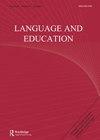‘Ahí fuimos jalando gente’ : transnational Latina mothers’ enactments of navigation and resistance in hyper-gentrified dual-language schools
IF 2.8
2区 文学
Q1 EDUCATION & EDUCATIONAL RESEARCH
引用次数: 0
Abstract
AbstractThis study explores the experiences of middle-class transnational Latina mothers whose children are enrolled in gentrified dual-language programs. Drawing upon the theory of differential consciousness, I explored how these mothers’ own complex identities informed their navigation of conflicting discourses that position dual-language education on one hand as part of an anti-racist, social justice movement, and conversely as a neoliberal enrichment tool that confers a competitive social advantage for privileged children. Ultimately, this paper highlights how mothers engaged differential consciousness to shift between these ideologies strategically, centering community and working to expand access to these programs to other Spanish-speaking and transnational families. In doing so, they increased racial and linguistic diversity—but not socioeconomic diversity—in these programs. This study argues for the importance of considering multiple dimensions of parent identity in dual-language programs, and for continually acknowledging the key role social class plays in families’ experiences of and access to these programs.Keywords: Dual-language educationgentrificationideologiesmothersparent involvementtransnational Disclosure statementAuthor has no conflict of interest to report.Ethics statementThe Human Subjects Division of the University of Washington’s Institutional Review Board waived the requirement to review this study. Informed consent was obtained orally from all participants.Additional informationNotes on contributorsGrace Cornell GonzalesGrace Cornell Gonzales is a doctoral candidate at the University of Washington’s College of Education, in Language, Literacy, and Culture. Her research focuses on equity and family engagement in dual-language bilingual programs, as well as multilingual literacy pedagogies.“Ahí fuimos jalando gente”:在高度士绅化的双语学校中,跨国拉丁裔母亲的导航和抵抗行为
摘要本研究探讨了中产阶级跨国拉丁裔母亲的经历,她们的孩子就读于士绅化的双语课程。根据差异意识理论,我探讨了这些母亲自己复杂的身份如何影响她们在冲突话语中的导航,这些话语一方面将双语教育定位为反种族主义、社会正义运动的一部分,另一方面又将其定位为新自由主义的丰富工具,为特权儿童提供竞争优势。最后,本文强调了母亲如何利用差异意识在这些意识形态之间进行战略性转变,以社区为中心,并努力将这些项目扩大到其他西班牙语家庭和跨国家庭。在这样做的过程中,他们在这些项目中增加了种族和语言的多样性,而不是社会经济的多样性。本研究论证了在双语项目中考虑父母身份的多个维度的重要性,以及不断承认社会阶层在家庭体验和获得这些项目方面所起的关键作用。关键词:双语教育士绅化民族意识形态父母参与跨国披露声明作者无利益冲突报告伦理声明华盛顿大学机构审查委员会人类受试者部放弃了审查本研究的要求。口头获得所有参与者的知情同意。作者简介格蕾丝·康奈尔·冈萨雷斯格蕾丝·康奈尔·冈萨雷斯是华盛顿大学教育学院语言、读写和文化专业的博士研究生。她的研究重点是双语双语项目中的公平和家庭参与,以及多语言扫盲教学法。
本文章由计算机程序翻译,如有差异,请以英文原文为准。
求助全文
约1分钟内获得全文
求助全文
来源期刊

Language and Education
Multiple-
CiteScore
4.70
自引率
0.00%
发文量
34
期刊介绍:
Language & Education provides a forum for the discussion of recent topics and issues in the language disciplines which have an immediate bearing upon thought and practice in education. Articles draw from their subject matter important and well-communicated implications for one or more of the following: curriculum, pedagogy or evaluation in education. The task of the Journal is to encourage language specialists and language in education researchers to organise and present their material in such a way as to highlight its educational implications, thereby influencing educational theorists and practitioners and therefore educational outcomes for individual children.
 求助内容:
求助内容: 应助结果提醒方式:
应助结果提醒方式:


